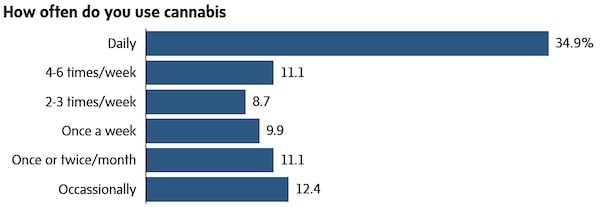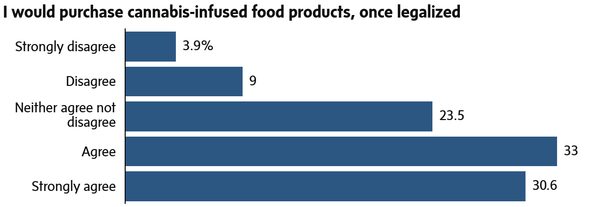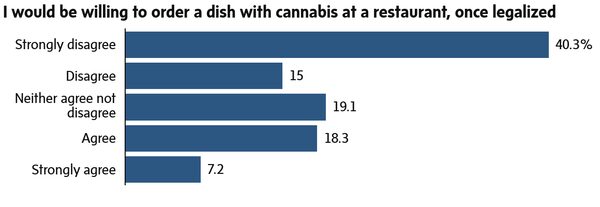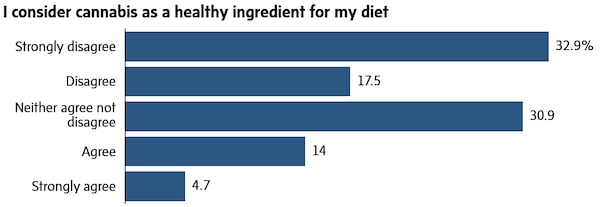As Canada prepares to legalize the sale of cannabis-infused foods and drinks later this year, the folks at Dalhousie University have gathering some surprising intelligence on the sort of reception those new products might receive. Based on a survey of 1051 Canadian adults conducted over four days in April and compared to the results of a similar survey from 2017, the team found more Canadians consider cannabis to be a healthy part of their overall diet, yet less seem willing to eat foods or drink beverages containing the drug.
Below, Cannabis Professional breaks down the key findings alongside explanations from Sylvain Charlebois, director of Dalhousie’s Institute of Agri-food Analytics, and the study’s lead author.
More than one in ten Canadians consumes cannabis daily

The study showed that 37 per cent of respondents identified as cannabis users and roughly one third of them, representing 13 per cent of the entire Canadian adult population, were daily consumers. Above is the breakdown of use.
- The 37 per cent figure cited in another chart in the study is dramatically higher than the most recent data from Statistics Canada, which found only about 15 per cent of Canadians aged 15 and older consumed cannabis in the last three months, with roughly one fifth of that group reporting daily use, equating to 3 per cent or one in 33 Canadian adults.
Asked to explain the disparity, Mr. Charlebois said he has “always been quite skeptical of StatsCan’s methodology on anything, starting with the [Consumer Price Index]. And every time my team comes out with a study, I connect with AC Nielsen because I think they actually get it right most of the time, and I won’t go into the details of conversations I’ve had with them but let me tell you I’m pretty confident in our survey and in our results.”
Canadians are already familiar with cannabis edibles, but are less willing to try them

can-pro-graphicThe Globe and Mail
More than one out of every four Canadians have tried a cannabis-infused food product before, the survey found.
- Nearly half of respondents that identified as regular cannabis consumers (46 per cent) said they were already “occasional” edibles consumers.
- More than one third of respondents (36 per cent) either agreed or strongly agreed with the statement “I would purchase cannabis-infused food products, once legalized”, but that figure was significantly lower than the 46 per cent of respondents who gave the same answer in 2017.
“I was surprised,” Mr. Charlebois said of the decline, noting “there were some anecdotes here and there that have suggested here is still a lot of issues with [legalization] that need to be addressed.” More broadly, Mr. Charlebois suggested the “lack of enthusiasm” comes from Prime Minister Justin Trudeau’s Liberals in 2015 “inviting the whole country to this mega party with great music, great fun, balloons and everything and we ended up in some boring, class reunion in some dodgy cafeteria.” Although he also conceded pre-legalization enthusiasm in 2017 “may have skewed some of our previous results since it was before done cannabis was legalized, so I think now people are starting to see that things aren’t going to be all that different really.”
Canadians less likely to pick cannabis items from restaurant menus

can-pro-graphicThe Globe and Mail
In 2017, more than 38 per cent of respondents expressed a willingness to order a dish containing cannabis at a restaurant.
- Two years later, only slightly above one in four respondents (25.5 per cent) expressed a similar willingness. Less than 16 per cent of respondents said they would be willing to replace the alcoholic beverage they usually order at a restaurant with a cannabis-based alternative, but in 2017 nearly 27 per cent of respondents (26.6 per cent) said they would be willing to switch.
Mr. Charlebois said those results were the opposite of his expectations. “Generally speaking there seems to be less enthusiasm, less intrigue, but I honestly think Health Canada has just sucked all the enthusiasm out of this initiative altogether,” Mr. Charlebois said. “Two years ago, if you had asked me where we would be in 2019 with the cannabis file, I would have said the [consumer product goods] companies sending out releases about new products they are planning, cannabis infused sauces, candies, chips, whatever, they would be trying to energize the marketplace. But now you see even less enthusiasm but the marketplace also remains largely uneducated on cannabinoids. How do you sell to an educated marketplace? That is the challenge.”
Support for cannabis as a “healthy ingredient” grows, but not by much

can-pro-graphicThe Canadian Press
Less Canadians seem willing to order cannabis at a restaurant, but apparently that is not because they consider it unhealthy.
- Nearly one in five respondents in the latest survey (18.7 per cent) agreed or strongly agreed with the statement “I consider cannabis as a healthy ingredient for my diet,” representing a substantial increase from the 12.6 per cent of respondents who supported a similar statement in 2017.
Despite being one of the few metrics that moved “in a logical direction,” Mr. Charlebois said “it is a very insignificant move, I was actually expecting more Canadians to believe that, because of the education out there, the needle would move a little bit farther. Still, though, not even one Canadian in five actually considers cannabis as a healthy product and I was expecting that number to be much higher two years later… the public is still cannabinoid-illiterate.”
 Jameson Berkow
Jameson Berkow